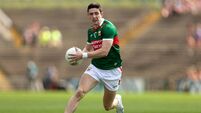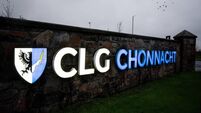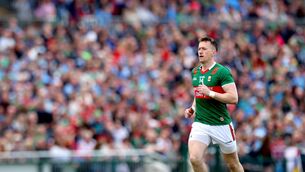Mayo’s timely reminder that we haven’t gone away
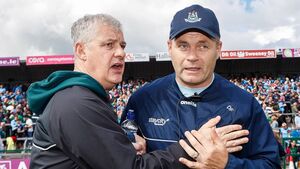
Mayo and Dublin managers Kevin McStay and Dessie Farrell share a moment after their teams served up a massively exciting All-Ireland SFC Round 3 match that ended in a draw at Dr Hyde Park last Sunday afternoon. Pictures: INPHO/Ryan Byrne
The rueful expression on Kevin McStay’s face told its own story at the end of 70-plus minutes of foot-to-the-floor frantic football: this was a movie he’d seen before. Perhaps he was thinking of his own playing career and that breakthrough year of 1985 when Mayo came so close to toppling Kevin Heffernan’s great Dublin side in Croke Park. He later recalled getting a lift from the then county board chairman PJ McGrath back to the team hotel and McGrath remarking: “Kevin, Mayo football is back in the big time now.”
It might be a stretch to suggest that last Sunday’s result in the Hyde brings Mayo football “back to the big time”, but it certainly offers reassurance that the men in Green and Red continue to dine at the top table. For much of this year, many Mayo fans – this writer included – have wondered whether a gap was opening up between the so-called top teams and Mayo, a gap that might prove difficult to bridge in the years ahead. However, last Sunday proved that Mayo, on their best days, can still go toe-to-toe with the championship heavyweights, and if they do navigate a tricky home tie against Derry next weekend, none of the four group winners will want to draw them in an All-Ireland quarter-final.
This was unquestionably Mayo’s best championship performance under McStay; better than the victory over Kerry in Killarney last May, which was achieved against a backdrop of a Kerry team that was not at full throttle. Dublin were at full throttle here – as evidenced by those final frenetic minutes – and Mayo were just a kick of the ball (or, in this case, a left-handed fisted point) away from a precious victory.
There was so much to like about Mayo’s performance, not least the never-say-die attitude and sheer bravery of the players on the field and, indeed, the management on the sideline. When it was announced before the throw-in that Rory Brickenden, a defender, was replacing the great Cillian O’Connor, there was a fear that McStay had opted for a rearguard action, and that we would witness a backs-to-the-wall performance from his side. Instead, the men in Green and Red went on the attack from the outset and were it not for several wasted opportunities in the first half, the score might have been very different at half-time.
Six points from 20 attacks was a poor return for the first 35 minutes, especially as Mayo were so adept at opening up the heart of the Dublin defence, creating several good goal-scoring opportunities that were just crying out for one final, killer pass. It is an area that has been a concern for Mayo since the start of the championship and it is definitely something that needs to be worked on at training. We saw it against Galway when Ryan O’Donoghue had an opportunity to put Mattie Ruane through for a near-certain goal and there were three instances on Sunday where Dublin were wide open at the back and one final hand-pass to a player right or left would have yielded a priceless goal.
Some of Mayo’s best work in the first-half came through Aidan O’Shea, who had one of his best games in a long and distinguished career. His free in the 32nd minute – at a time when O’Donoghue was struggling to find his scoring range – was superb, not least because it was scored into a raucous ‘Hill 16 on Tour’. If O’Shea can continue his rich vein of form into next weekend – and, hopefully, beyond – more goal-scoring opportunities will come Mayo’s way. He is virtually impossible to dispossess, no matter how many opposition players surround him, and he must be the most fouled-against GAA player in modern history.
A one-point advantage flattered Dublin at half-time. Their talismanic midfielder Brian Fenton was a peripheral figure, thanks to the Lee Keegan-esque efforts of Donnacha McHugh, who has emerged as one of the real stars of this new-look Mayo team. McHugh has now delivered three brilliant man-marking performances in the last three championship ties, and no opposition player will want to see him heading in their direction at the start of a game.
Much was made of Dublin’s ability to grind teams down in the third quarter, but Mayo actually emerged from that period with the scores tied at 0-12 each. Indeed, it is worth noting that the men in Green and Red scored as much in that crucial period as they did in the entire first-half, and five of those six Mayo points came from play.
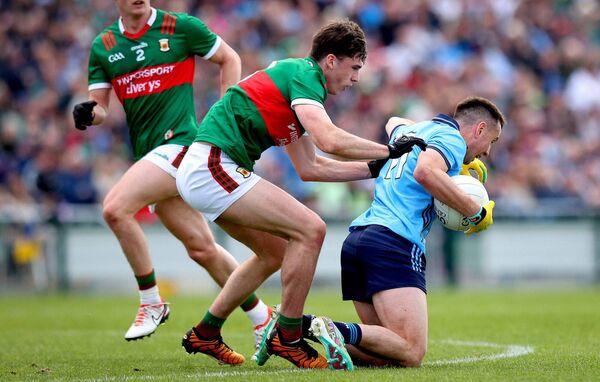
Dublin, as expected, kicked for home with the introduction of Paul Mannion and the speed merchant Jack McCaffrey who would give Rashidat Adeleke a run for her money. Within ten minutes of their introduction, both substitutes had posted scores and Dublin were two points in front. Yet Mayo somehow hauled themselves back into contention once again through the outstanding Ryan O’Donoghue who, by now, had certainly found his scoring range and was kicking a couple of fabulous long-distance efforts. Mayo got the rub of the green in the final minutes with a ‘50’ that wasn’t and a fairly dubious ‘foul’ on O’Donoghue, but we have had our share of bad refereeing decisions against Dublin over the last decade, so we will take those as long overdue.
With barely a minute of stoppage time left, Dublin seemed destined for the preliminary round draw on Monday morning until some of their senior players – Cluxton, Ciaran Kilkenny, McCaffrey and Cormac Costello – drew on all of their battle-hardened experience to snatch a draw with the last play of the day. Costello’s presence of mind to fist the ball over with his left hand after he momentarily lost his balance has to be admired; he had an exceptional day and was deserving of the Man of the Match.
Mayo now have a quick turnaround before facing Derry in MacHale Park. Derry were far from impressive in their victory over Westmeath, but it is worth remembering that they were one of the favourites for the All-Ireland title just six weeks ago. In fact, they came to Castlebar on St Patrick’s Day and put on an exhibition of free-flowing, attacking football, so they are not to be underestimated, even if their championship form has been unrecognisable to their league campaign.
Mayo’s patchy record in MacHale Park is often remarked upon but it is actually 26 years since the senior team lost a do-or-die championship tie in their home ground. That was an epic defeat to Galway in the 1998 Connacht Championship Final on an afternoon when Ciaran McDonald came within the width of a crossbar of scoring a hat-trick and denying Galway a path to the All-Ireland Final, which they ultimately won. It was, of course, the era of knock-out provincial championships, and in the 23 years since the ‘back door’ system was introduced, Mayo have only played six winner-takes-all ties at MacHale Park and all six have resulted in home victories, namely Roscommon (2002), Cavan (2007), Fermanagh and Kildare (2016), Derry (2017) and Monaghan (2022).
Next weekend will be our third championship clash with Derry in 17 years, and they have been problematic opposition for us. We were defeated in Derry in 2007 and needed extra-time (and a memorable goal from Conor Loftus) to beat them in MacHale Park a decade later.
But this Mayo team will surely take heart from their outstanding performance last Sunday and will be determined to give the home fans something to cheer about, as well as securing a place in the All-Ireland quarter-finals. Based on last Sunday’s display, it would be a real shame if this group of Mayo footballers did not get the chance to play championship football in Croke Park this summer. They have given the competition a badly-needed boost and they have reminded the country – and, indeed, many of their own fans – that they are still “in the big time”.

